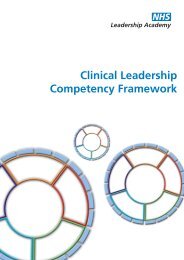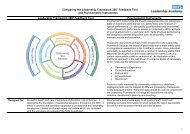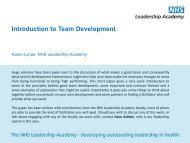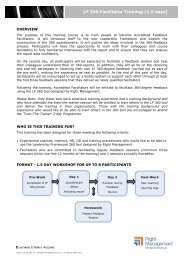Healthy NHS Board: a review of - NHS Leadership Academy
Healthy NHS Board: a review of - NHS Leadership Academy
Healthy NHS Board: a review of - NHS Leadership Academy
You also want an ePaper? Increase the reach of your titles
YUMPU automatically turns print PDFs into web optimized ePapers that Google loves.
3.3 Shaping culture<br />
The board role <strong>of</strong> shaping cultures was presented as one<br />
<strong>of</strong> growing importance in our original <strong>review</strong>. If anything,<br />
this has accelerated since 2010, with greater specification<br />
<strong>of</strong> what ‘a healthy culture’ might look like and evidence<br />
<strong>of</strong> approaches that might support its development. The<br />
Francis report noted numerous failures to put the patient<br />
first and identifies the need to develop a ‘patient safety<br />
culture’ across the English <strong>NHS</strong> (Francis, 2013). The<br />
recognition that culture is something most effectively<br />
addressed at a local level anticipates a central role for<br />
board leadership (Francis, 2013, Davies and Mannion,<br />
2013).<br />
Our original <strong>review</strong> noted that the complex relationships<br />
between board culture, organisational culture,<br />
and organisational performance required further<br />
exploration. Of note is a recent update to an analysis<br />
<strong>of</strong> the relationship between organisational culture (as<br />
assessed by senior management) and performance,<br />
applying the Competing Values Framework. The analysis<br />
confirms previous findings that the issues that are<br />
valued by particular cultures (for example innovation<br />
in ‘developmental’ cultures, and competitiveness in<br />
‘rational’ cultures) tend to predict the domains in which<br />
organisations exhibiting such cultures will perform best.<br />
Of particular interest is that, while cultures maintained<br />
over time to an extent, overall there was a tendency for<br />
cultures to become increasingly blended. The authors<br />
note that a significant task is to shape blends <strong>of</strong> cultures<br />
that support high performance on locally prioritised<br />
issues (Jacobs et al., 2012).<br />
In shaping culture, it is recommended that boards<br />
describe clearly what the desired culture looks like,<br />
lead by example by adopting these behaviours in all<br />
interactions and communicating this culture clearly<br />
throughout the organisation. Also, they should assess<br />
how well the culture is experienced by stakeholders,<br />
taking action where necessary (Alimo-Metcalfe, 2012,<br />
Monitor, 2013).<br />
Reviews <strong>of</strong> effective board engagement suggest that<br />
a healthy culture promotes innovation, improvement<br />
and quality: in support <strong>of</strong> this, boards should shape<br />
a culture that is ‘ready for change’, featuring high<br />
staff engagement and wellbeing (Alimo-Metcalfe,<br />
2012, Welbourn et al., 2012). Other features <strong>of</strong><br />
readiness include staff autonomy, high social support,<br />
encouragement <strong>of</strong> active problem solving, staff who are<br />
confident in their ability to deal with change, and staff<br />
whose jobs are challenging but who feel empowered to<br />
manage them (Alimo-Metcalfe, 2012). Where culture is<br />
strong, organisational development staff should explore<br />
ways to spread this further across the organisation<br />
(Alimo-Metcalfe, 2012).<br />
‘Schwartz Centre Rounds’ are a potentially useful means<br />
<strong>of</strong> shaping culture. These are regularly held meetings<br />
where a range <strong>of</strong> staff discuss and reflect on the<br />
emotional aspects <strong>of</strong> providing care. They have been<br />
independently evaluated in US and UK settings, with<br />
positive effects reported. The UK evaluation findings<br />
suggest a range <strong>of</strong> cultural benefits at individual level<br />
(for example, confidence and compassion), team<br />
level (networking, multidisciplinary working) and<br />
organisational level (reduced hierarchy, open culture,<br />
support for strategic vision, symbolism <strong>of</strong> management’s<br />
care for staff wellbeing) (Goodrich, 2011).<br />
Research on <strong>NHS</strong> Foundation Trusts suggests that<br />
governors have the capacity to influence both board<br />
and organisational culture, but that this capacity might<br />
be enhanced by strengthening the governor role,<br />
and through boards providing greater support and<br />
engagement (Wright et al., 2011).<br />
www.leadershipacademy.nhs.uk 19











